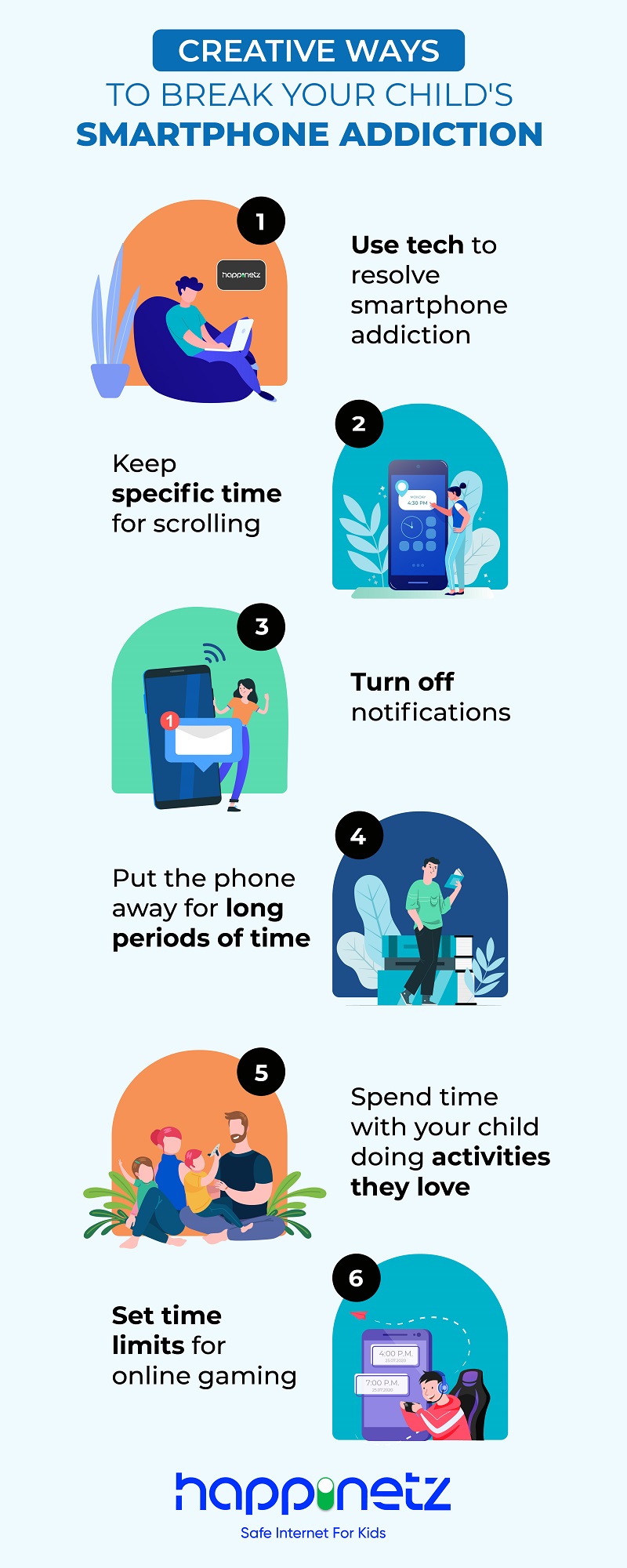Every house has a smartphone these days. In fact, every adult has a smartphone and teens also demand to get one. Children may not have their own mobile phones but they are very mobile savvy. They know how to use apps, play games and look up information on Google. As compared to a few years ago, mobile and internet usage has grown phenomenally. Many parents claim that their children are addicted to mobiles. It is not a good scenario because mobile addiction may lead to behavioral and developmental problems.
What is smartphone addiction
Smartphone addiction is the compulsive overuse of mobile devices. It can lead to problematic patterns and behaviors in children, such as feeling anxious or aggressive when they cannot use their mobiles.
Warning signs of smartphone addiction in children
If your child has difficulty in sleeping, has constant worry about the phone, has angry outbursts especially when the phone is taken away, is isolated from others and using mobile for long periods of time, it could be signs of mobile addiction.
Creative ways to break your child's smartphone addiction
With children, you should be patient and creative to break their mobile addiction.
Use tech to resolve smartphone addiction
We are quick to blame technology for our problems such as mobile addiction. But we can use technology to break mobile addiction in children. Happinetz box is one such solution which can be installed in just 5 minutes. You can attach it to your home wi fi, and control upto 10 devices in your home, including laptops, mobile phones and smart TVs.
Read more about the box here.

Keep specific time for scrolling
Make rules in your home about when a child can use mobile phones. As adults, you would need to stop using phones all the time because children follow their parents' example. With Happinetz box, you can set time limits for a particular device. The internet will switch off for the day once time is up. There would be no more arguments every time you want to enforce mobile use limits.
Turn off notifications
You should turn off notifications for the apps on your mobile phones so that no one is distracted by every ping. This also keeps away the temptation to use mobiles every time there is a message/notification.
Put the phone away for long periods of time
Don't keep the mobile around all the time. Keep them in another room while you are eating meals, or while the children are doing their homework.
Spend time with your child doing activities they love
As a parent, spend quality time with your children. Bond with them over activities they love to do such as going to the market or the mall, painting, playing board games etc.
If your child is reluctant, make it a game by doing activities from the Happinetz cards that you get with the Happinetz box.
Set time limits for online gaming
Children spend a lot of their time playing games on the mobiles. These games are addictive, with excessive violence and sometimes content inappropriate for their age. For children under 13 years, you can let them play games for a limited time from the apps recommended by Happinetz in the Kids mode. You can be assured that these games are child-friendly.
Set rules around smartphone use
Set some rules in your house, such as no mobile use right after coming from school, or at bedtime. Parents should also stick to these rules.
Read a book together
Take your child to a library or the local book store. Pick a book that you would love to read together and even discuss. This would keep their mind away from mobile phones.
Go for regular park visits
Parks are good fun for children. Apart from getting physical activity, they also get to play games of their choice with other children.
Enroll your child in a hobby class of their choice
Based on your child's interests, look for a hobby class that you can take them to. It could be music lessons or art or DIY or anything else your child likes to do.
Invite their friends
Have frequent get-togethers with friends so that children spend time in the company of their friends and not mobile phones.
Let your teen understand the negative impact of smartphone addiction
Talk to your children how harmful mobile addiction can be. If your children are younger, point out their behaviors that are causing problems so that they understand that overuse of mobile phones is not good.
Talk about harmful online content
There is a lot of age-inappropriate content on the internet. You can not always be checking what your children are watching. Use Happinetz box that filters the internet to make sure no harmful content reaches your child. It tracks more than 110 million websites on a regular basis, blocking 18 million adult websites 4 million unsafe websites, so that your child has access to safe internet only.
Be one step ahead in monitoring your child's smartphone usage
Even when you tell your child about rules and internet limits they might be not listen to you. They are curious by nature and sometimes want to see if they can crack the limits you have set. With Happinetz box, you can be assured that you will get an SOS alert on your phone whenever your child's device is disconnected from Happinetz wi fi.
Talk to other parents
Make friends with the parents of your friends. Share what works with your children when it comes to mobile addiction. You can always resolve any situation you are stuck in by knowing about others' experiences.
Mobile addiction in children is alarming but not impossible to break. Use the tips we have shared with you and be a stress free parent.
FAQs
What are the psychological effects of cell phone addiction?
Cell phone addiction can show up as poor sleep, anxiety, stress and impaired relationships.
What are the effects of smartphone addiction on students?
Smartphone addiction has negative impacts on student learning and overall academic performance. Even though children frequently use the internet for their school homework, researching for their assignments, looking for creative ideas to present their work, overuse of smartphones can be distracting, thereby affecting their marks in exams.




